Alibaba's IPO: A Case Study on Value Creation and Financial Decisions
VerifiedAdded on 2023/05/31
|6
|2375
|218
Case Study
AI Summary
This case study analyzes Alibaba's IPO, focusing on value creation, the rationale behind its decisions, and the impact of its unique Variable Interest Entity (VIE) structure. It examines the benefits and drawbacks of going public, Alibaba's motivations for choosing the New York Stock Exchange (NYSE), and the utilization of IPO proceeds. The analysis extends to the role of underwriters, the assessment of the IPO issue price, and the short-term and long-term performance of Alibaba's stock. Furthermore, the study delves into the evolution of Alibaba's capital structure since its IPO, highlighting the balance between debt and equity. The case study also discusses the implications of the Alibaba Partnership and VIE structure on new investors. Desklib provides access to this case study and other resources to aid students in their academic pursuits.
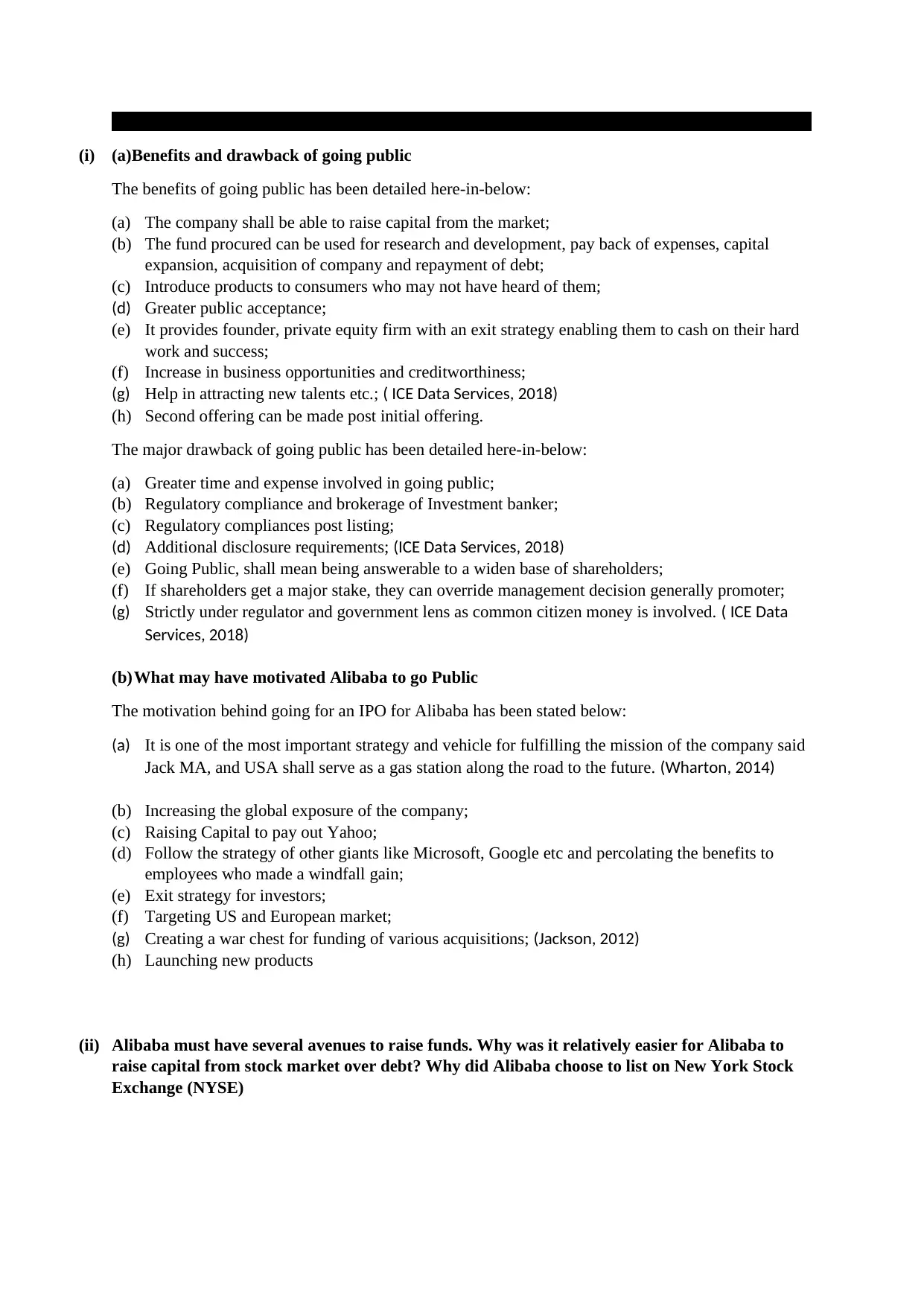
Value Creation-IPO Chapter
(i) (a)Benefits and drawback of going public
The benefits of going public has been detailed here-in-below:
(a) The company shall be able to raise capital from the market;
(b) The fund procured can be used for research and development, pay back of expenses, capital
expansion, acquisition of company and repayment of debt;
(c) Introduce products to consumers who may not have heard of them;
(d) Greater public acceptance;
(e) It provides founder, private equity firm with an exit strategy enabling them to cash on their hard
work and success;
(f) Increase in business opportunities and creditworthiness;
(g) Help in attracting new talents etc.; ( ICE Data Services, 2018)
(h) Second offering can be made post initial offering.
The major drawback of going public has been detailed here-in-below:
(a) Greater time and expense involved in going public;
(b) Regulatory compliance and brokerage of Investment banker;
(c) Regulatory compliances post listing;
(d) Additional disclosure requirements; (ICE Data Services, 2018)
(e) Going Public, shall mean being answerable to a widen base of shareholders;
(f) If shareholders get a major stake, they can override management decision generally promoter;
(g) Strictly under regulator and government lens as common citizen money is involved. ( ICE Data
Services, 2018)
(b)What may have motivated Alibaba to go Public
The motivation behind going for an IPO for Alibaba has been stated below:
(a) It is one of the most important strategy and vehicle for fulfilling the mission of the company said
Jack MA, and USA shall serve as a gas station along the road to the future. (Wharton, 2014)
(b) Increasing the global exposure of the company;
(c) Raising Capital to pay out Yahoo;
(d) Follow the strategy of other giants like Microsoft, Google etc and percolating the benefits to
employees who made a windfall gain;
(e) Exit strategy for investors;
(f) Targeting US and European market;
(g) Creating a war chest for funding of various acquisitions; (Jackson, 2012)
(h) Launching new products
(ii) Alibaba must have several avenues to raise funds. Why was it relatively easier for Alibaba to
raise capital from stock market over debt? Why did Alibaba choose to list on New York Stock
Exchange (NYSE)
(i) (a)Benefits and drawback of going public
The benefits of going public has been detailed here-in-below:
(a) The company shall be able to raise capital from the market;
(b) The fund procured can be used for research and development, pay back of expenses, capital
expansion, acquisition of company and repayment of debt;
(c) Introduce products to consumers who may not have heard of them;
(d) Greater public acceptance;
(e) It provides founder, private equity firm with an exit strategy enabling them to cash on their hard
work and success;
(f) Increase in business opportunities and creditworthiness;
(g) Help in attracting new talents etc.; ( ICE Data Services, 2018)
(h) Second offering can be made post initial offering.
The major drawback of going public has been detailed here-in-below:
(a) Greater time and expense involved in going public;
(b) Regulatory compliance and brokerage of Investment banker;
(c) Regulatory compliances post listing;
(d) Additional disclosure requirements; (ICE Data Services, 2018)
(e) Going Public, shall mean being answerable to a widen base of shareholders;
(f) If shareholders get a major stake, they can override management decision generally promoter;
(g) Strictly under regulator and government lens as common citizen money is involved. ( ICE Data
Services, 2018)
(b)What may have motivated Alibaba to go Public
The motivation behind going for an IPO for Alibaba has been stated below:
(a) It is one of the most important strategy and vehicle for fulfilling the mission of the company said
Jack MA, and USA shall serve as a gas station along the road to the future. (Wharton, 2014)
(b) Increasing the global exposure of the company;
(c) Raising Capital to pay out Yahoo;
(d) Follow the strategy of other giants like Microsoft, Google etc and percolating the benefits to
employees who made a windfall gain;
(e) Exit strategy for investors;
(f) Targeting US and European market;
(g) Creating a war chest for funding of various acquisitions; (Jackson, 2012)
(h) Launching new products
(ii) Alibaba must have several avenues to raise funds. Why was it relatively easier for Alibaba to
raise capital from stock market over debt? Why did Alibaba choose to list on New York Stock
Exchange (NYSE)
Paraphrase This Document
Need a fresh take? Get an instant paraphrase of this document with our AI Paraphraser
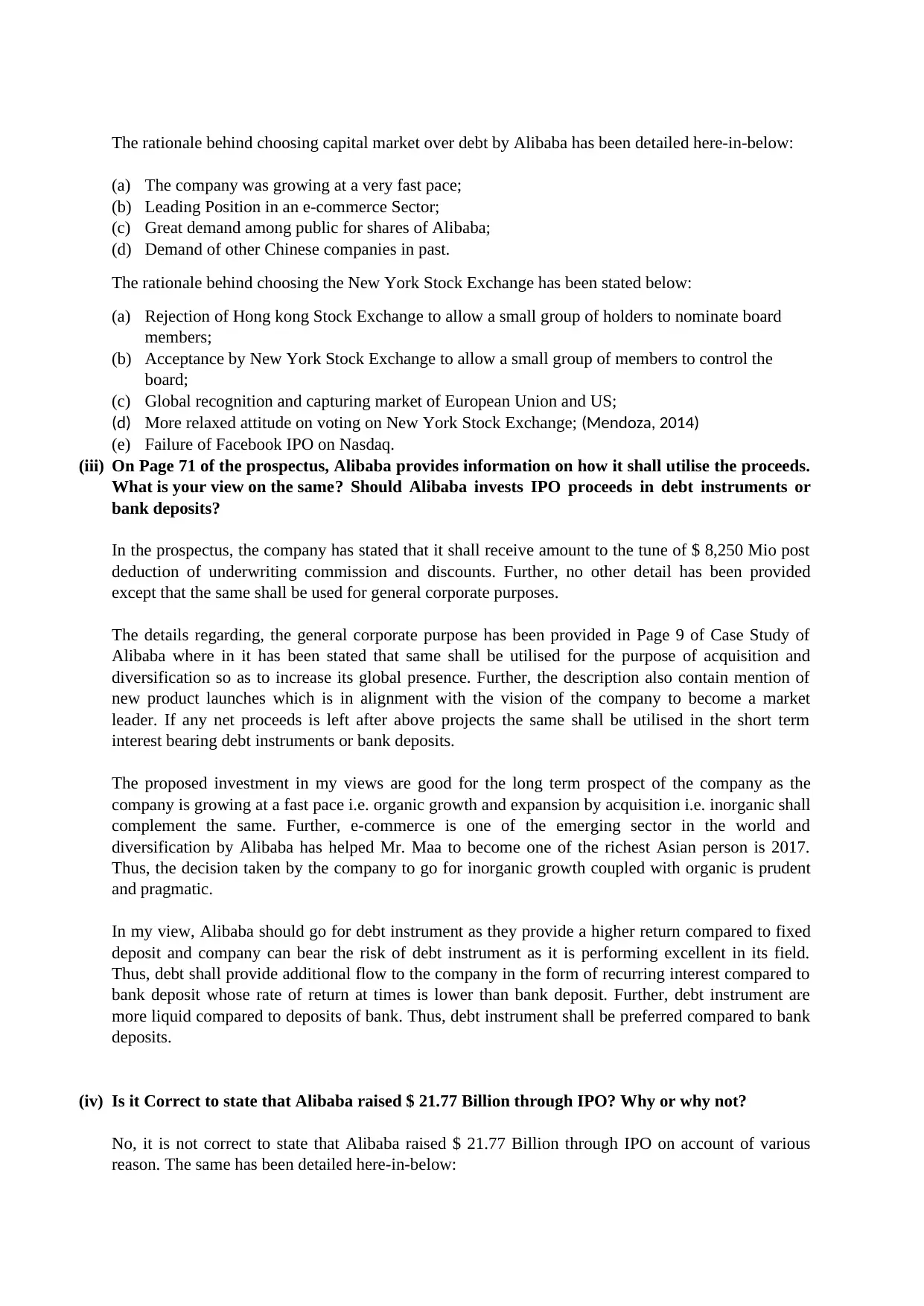
The rationale behind choosing capital market over debt by Alibaba has been detailed here-in-below:
(a) The company was growing at a very fast pace;
(b) Leading Position in an e-commerce Sector;
(c) Great demand among public for shares of Alibaba;
(d) Demand of other Chinese companies in past.
The rationale behind choosing the New York Stock Exchange has been stated below:
(a) Rejection of Hong kong Stock Exchange to allow a small group of holders to nominate board
members;
(b) Acceptance by New York Stock Exchange to allow a small group of members to control the
board;
(c) Global recognition and capturing market of European Union and US;
(d) More relaxed attitude on voting on New York Stock Exchange; (Mendoza, 2014)
(e) Failure of Facebook IPO on Nasdaq.
(iii) On Page 71 of the prospectus, Alibaba provides information on how it shall utilise the proceeds.
What is your view on the same? Should Alibaba invests IPO proceeds in debt instruments or
bank deposits?
In the prospectus, the company has stated that it shall receive amount to the tune of $ 8,250 Mio post
deduction of underwriting commission and discounts. Further, no other detail has been provided
except that the same shall be used for general corporate purposes.
The details regarding, the general corporate purpose has been provided in Page 9 of Case Study of
Alibaba where in it has been stated that same shall be utilised for the purpose of acquisition and
diversification so as to increase its global presence. Further, the description also contain mention of
new product launches which is in alignment with the vision of the company to become a market
leader. If any net proceeds is left after above projects the same shall be utilised in the short term
interest bearing debt instruments or bank deposits.
The proposed investment in my views are good for the long term prospect of the company as the
company is growing at a fast pace i.e. organic growth and expansion by acquisition i.e. inorganic shall
complement the same. Further, e-commerce is one of the emerging sector in the world and
diversification by Alibaba has helped Mr. Maa to become one of the richest Asian person is 2017.
Thus, the decision taken by the company to go for inorganic growth coupled with organic is prudent
and pragmatic.
In my view, Alibaba should go for debt instrument as they provide a higher return compared to fixed
deposit and company can bear the risk of debt instrument as it is performing excellent in its field.
Thus, debt shall provide additional flow to the company in the form of recurring interest compared to
bank deposit whose rate of return at times is lower than bank deposit. Further, debt instrument are
more liquid compared to deposits of bank. Thus, debt instrument shall be preferred compared to bank
deposits.
(iv) Is it Correct to state that Alibaba raised $ 21.77 Billion through IPO? Why or why not?
No, it is not correct to state that Alibaba raised $ 21.77 Billion through IPO on account of various
reason. The same has been detailed here-in-below:
(a) The company was growing at a very fast pace;
(b) Leading Position in an e-commerce Sector;
(c) Great demand among public for shares of Alibaba;
(d) Demand of other Chinese companies in past.
The rationale behind choosing the New York Stock Exchange has been stated below:
(a) Rejection of Hong kong Stock Exchange to allow a small group of holders to nominate board
members;
(b) Acceptance by New York Stock Exchange to allow a small group of members to control the
board;
(c) Global recognition and capturing market of European Union and US;
(d) More relaxed attitude on voting on New York Stock Exchange; (Mendoza, 2014)
(e) Failure of Facebook IPO on Nasdaq.
(iii) On Page 71 of the prospectus, Alibaba provides information on how it shall utilise the proceeds.
What is your view on the same? Should Alibaba invests IPO proceeds in debt instruments or
bank deposits?
In the prospectus, the company has stated that it shall receive amount to the tune of $ 8,250 Mio post
deduction of underwriting commission and discounts. Further, no other detail has been provided
except that the same shall be used for general corporate purposes.
The details regarding, the general corporate purpose has been provided in Page 9 of Case Study of
Alibaba where in it has been stated that same shall be utilised for the purpose of acquisition and
diversification so as to increase its global presence. Further, the description also contain mention of
new product launches which is in alignment with the vision of the company to become a market
leader. If any net proceeds is left after above projects the same shall be utilised in the short term
interest bearing debt instruments or bank deposits.
The proposed investment in my views are good for the long term prospect of the company as the
company is growing at a fast pace i.e. organic growth and expansion by acquisition i.e. inorganic shall
complement the same. Further, e-commerce is one of the emerging sector in the world and
diversification by Alibaba has helped Mr. Maa to become one of the richest Asian person is 2017.
Thus, the decision taken by the company to go for inorganic growth coupled with organic is prudent
and pragmatic.
In my view, Alibaba should go for debt instrument as they provide a higher return compared to fixed
deposit and company can bear the risk of debt instrument as it is performing excellent in its field.
Thus, debt shall provide additional flow to the company in the form of recurring interest compared to
bank deposit whose rate of return at times is lower than bank deposit. Further, debt instrument are
more liquid compared to deposits of bank. Thus, debt instrument shall be preferred compared to bank
deposits.
(iv) Is it Correct to state that Alibaba raised $ 21.77 Billion through IPO? Why or why not?
No, it is not correct to state that Alibaba raised $ 21.77 Billion through IPO on account of various
reason. The same has been detailed here-in-below:
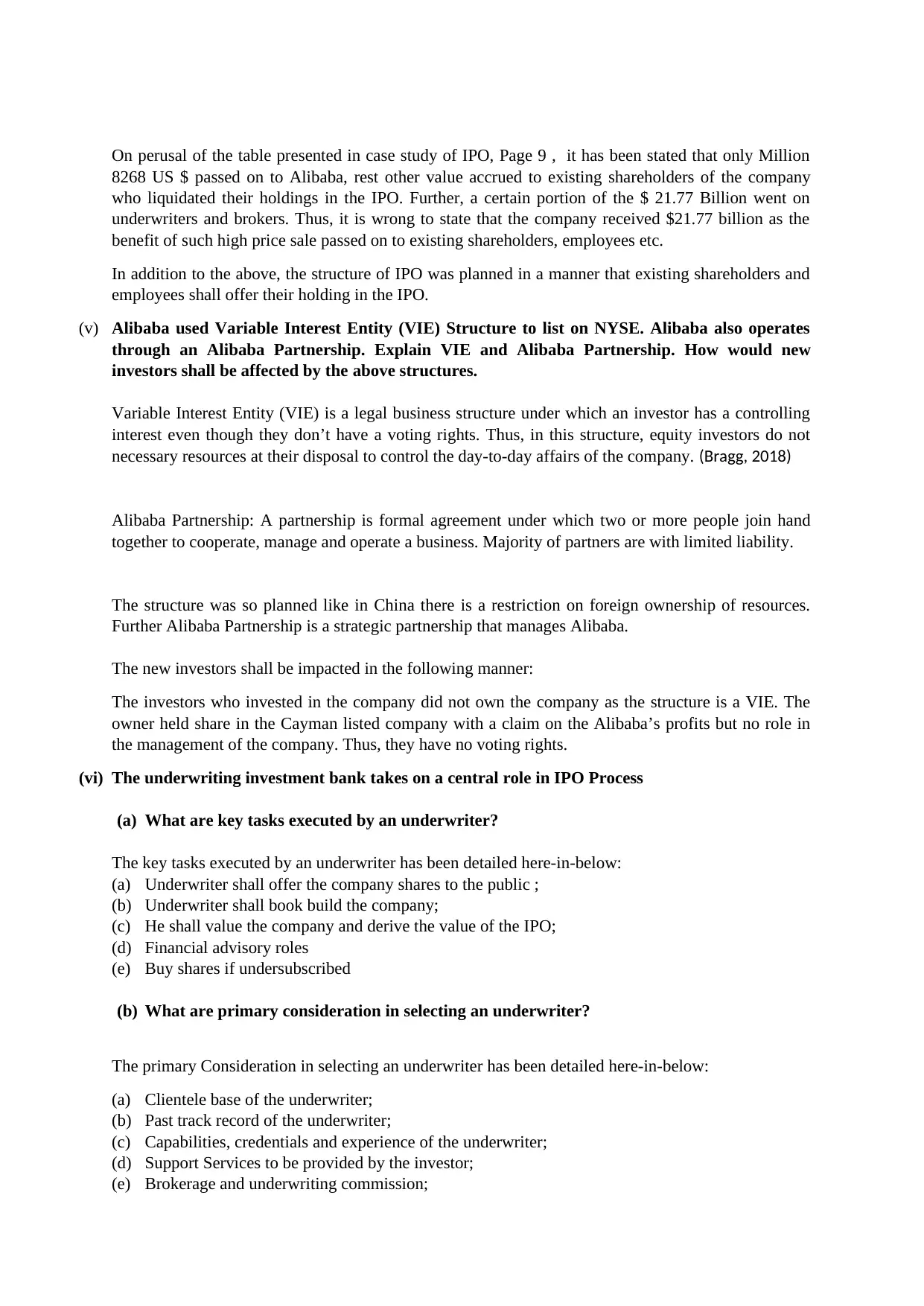
On perusal of the table presented in case study of IPO, Page 9 , it has been stated that only Million
8268 US $ passed on to Alibaba, rest other value accrued to existing shareholders of the company
who liquidated their holdings in the IPO. Further, a certain portion of the $ 21.77 Billion went on
underwriters and brokers. Thus, it is wrong to state that the company received $21.77 billion as the
benefit of such high price sale passed on to existing shareholders, employees etc.
In addition to the above, the structure of IPO was planned in a manner that existing shareholders and
employees shall offer their holding in the IPO.
(v) Alibaba used Variable Interest Entity (VIE) Structure to list on NYSE. Alibaba also operates
through an Alibaba Partnership. Explain VIE and Alibaba Partnership. How would new
investors shall be affected by the above structures.
Variable Interest Entity (VIE) is a legal business structure under which an investor has a controlling
interest even though they don’t have a voting rights. Thus, in this structure, equity investors do not
necessary resources at their disposal to control the day-to-day affairs of the company. (Bragg, 2018)
Alibaba Partnership: A partnership is formal agreement under which two or more people join hand
together to cooperate, manage and operate a business. Majority of partners are with limited liability.
The structure was so planned like in China there is a restriction on foreign ownership of resources.
Further Alibaba Partnership is a strategic partnership that manages Alibaba.
The new investors shall be impacted in the following manner:
The investors who invested in the company did not own the company as the structure is a VIE. The
owner held share in the Cayman listed company with a claim on the Alibaba’s profits but no role in
the management of the company. Thus, they have no voting rights.
(vi) The underwriting investment bank takes on a central role in IPO Process
(a) What are key tasks executed by an underwriter?
The key tasks executed by an underwriter has been detailed here-in-below:
(a) Underwriter shall offer the company shares to the public ;
(b) Underwriter shall book build the company;
(c) He shall value the company and derive the value of the IPO;
(d) Financial advisory roles
(e) Buy shares if undersubscribed
(b) What are primary consideration in selecting an underwriter?
The primary Consideration in selecting an underwriter has been detailed here-in-below:
(a) Clientele base of the underwriter;
(b) Past track record of the underwriter;
(c) Capabilities, credentials and experience of the underwriter;
(d) Support Services to be provided by the investor;
(e) Brokerage and underwriting commission;
8268 US $ passed on to Alibaba, rest other value accrued to existing shareholders of the company
who liquidated their holdings in the IPO. Further, a certain portion of the $ 21.77 Billion went on
underwriters and brokers. Thus, it is wrong to state that the company received $21.77 billion as the
benefit of such high price sale passed on to existing shareholders, employees etc.
In addition to the above, the structure of IPO was planned in a manner that existing shareholders and
employees shall offer their holding in the IPO.
(v) Alibaba used Variable Interest Entity (VIE) Structure to list on NYSE. Alibaba also operates
through an Alibaba Partnership. Explain VIE and Alibaba Partnership. How would new
investors shall be affected by the above structures.
Variable Interest Entity (VIE) is a legal business structure under which an investor has a controlling
interest even though they don’t have a voting rights. Thus, in this structure, equity investors do not
necessary resources at their disposal to control the day-to-day affairs of the company. (Bragg, 2018)
Alibaba Partnership: A partnership is formal agreement under which two or more people join hand
together to cooperate, manage and operate a business. Majority of partners are with limited liability.
The structure was so planned like in China there is a restriction on foreign ownership of resources.
Further Alibaba Partnership is a strategic partnership that manages Alibaba.
The new investors shall be impacted in the following manner:
The investors who invested in the company did not own the company as the structure is a VIE. The
owner held share in the Cayman listed company with a claim on the Alibaba’s profits but no role in
the management of the company. Thus, they have no voting rights.
(vi) The underwriting investment bank takes on a central role in IPO Process
(a) What are key tasks executed by an underwriter?
The key tasks executed by an underwriter has been detailed here-in-below:
(a) Underwriter shall offer the company shares to the public ;
(b) Underwriter shall book build the company;
(c) He shall value the company and derive the value of the IPO;
(d) Financial advisory roles
(e) Buy shares if undersubscribed
(b) What are primary consideration in selecting an underwriter?
The primary Consideration in selecting an underwriter has been detailed here-in-below:
(a) Clientele base of the underwriter;
(b) Past track record of the underwriter;
(c) Capabilities, credentials and experience of the underwriter;
(d) Support Services to be provided by the investor;
(e) Brokerage and underwriting commission;
⊘ This is a preview!⊘
Do you want full access?
Subscribe today to unlock all pages.

Trusted by 1+ million students worldwide
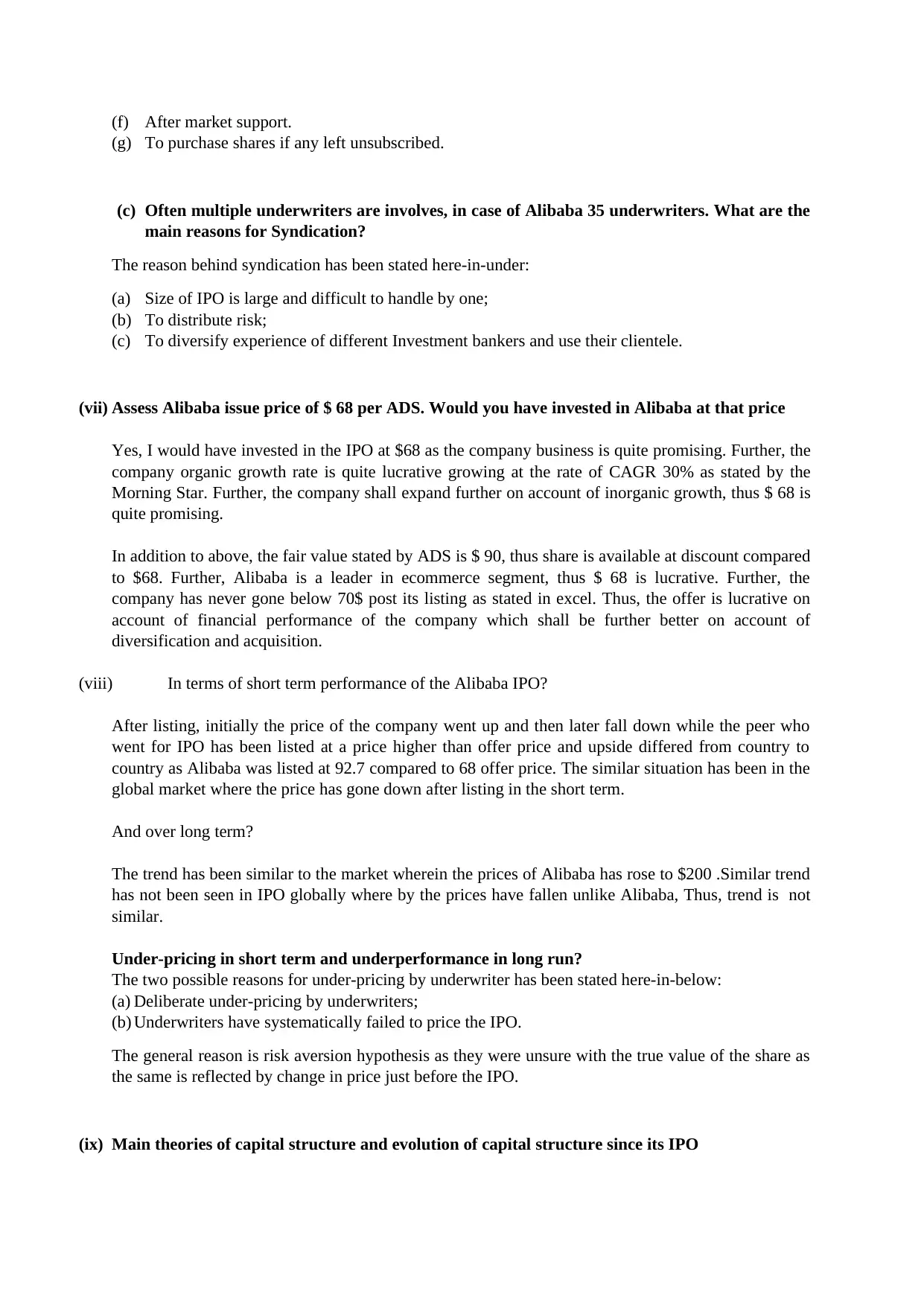
(f) After market support.
(g) To purchase shares if any left unsubscribed.
(c) Often multiple underwriters are involves, in case of Alibaba 35 underwriters. What are the
main reasons for Syndication?
The reason behind syndication has been stated here-in-under:
(a) Size of IPO is large and difficult to handle by one;
(b) To distribute risk;
(c) To diversify experience of different Investment bankers and use their clientele.
(vii) Assess Alibaba issue price of $ 68 per ADS. Would you have invested in Alibaba at that price
Yes, I would have invested in the IPO at $68 as the company business is quite promising. Further, the
company organic growth rate is quite lucrative growing at the rate of CAGR 30% as stated by the
Morning Star. Further, the company shall expand further on account of inorganic growth, thus $ 68 is
quite promising.
In addition to above, the fair value stated by ADS is $ 90, thus share is available at discount compared
to $68. Further, Alibaba is a leader in ecommerce segment, thus $ 68 is lucrative. Further, the
company has never gone below 70$ post its listing as stated in excel. Thus, the offer is lucrative on
account of financial performance of the company which shall be further better on account of
diversification and acquisition.
(viii) In terms of short term performance of the Alibaba IPO?
After listing, initially the price of the company went up and then later fall down while the peer who
went for IPO has been listed at a price higher than offer price and upside differed from country to
country as Alibaba was listed at 92.7 compared to 68 offer price. The similar situation has been in the
global market where the price has gone down after listing in the short term.
And over long term?
The trend has been similar to the market wherein the prices of Alibaba has rose to $200 .Similar trend
has not been seen in IPO globally where by the prices have fallen unlike Alibaba, Thus, trend is not
similar.
Under-pricing in short term and underperformance in long run?
The two possible reasons for under-pricing by underwriter has been stated here-in-below:
(a) Deliberate under-pricing by underwriters;
(b) Underwriters have systematically failed to price the IPO.
The general reason is risk aversion hypothesis as they were unsure with the true value of the share as
the same is reflected by change in price just before the IPO.
(ix) Main theories of capital structure and evolution of capital structure since its IPO
(g) To purchase shares if any left unsubscribed.
(c) Often multiple underwriters are involves, in case of Alibaba 35 underwriters. What are the
main reasons for Syndication?
The reason behind syndication has been stated here-in-under:
(a) Size of IPO is large and difficult to handle by one;
(b) To distribute risk;
(c) To diversify experience of different Investment bankers and use their clientele.
(vii) Assess Alibaba issue price of $ 68 per ADS. Would you have invested in Alibaba at that price
Yes, I would have invested in the IPO at $68 as the company business is quite promising. Further, the
company organic growth rate is quite lucrative growing at the rate of CAGR 30% as stated by the
Morning Star. Further, the company shall expand further on account of inorganic growth, thus $ 68 is
quite promising.
In addition to above, the fair value stated by ADS is $ 90, thus share is available at discount compared
to $68. Further, Alibaba is a leader in ecommerce segment, thus $ 68 is lucrative. Further, the
company has never gone below 70$ post its listing as stated in excel. Thus, the offer is lucrative on
account of financial performance of the company which shall be further better on account of
diversification and acquisition.
(viii) In terms of short term performance of the Alibaba IPO?
After listing, initially the price of the company went up and then later fall down while the peer who
went for IPO has been listed at a price higher than offer price and upside differed from country to
country as Alibaba was listed at 92.7 compared to 68 offer price. The similar situation has been in the
global market where the price has gone down after listing in the short term.
And over long term?
The trend has been similar to the market wherein the prices of Alibaba has rose to $200 .Similar trend
has not been seen in IPO globally where by the prices have fallen unlike Alibaba, Thus, trend is not
similar.
Under-pricing in short term and underperformance in long run?
The two possible reasons for under-pricing by underwriter has been stated here-in-below:
(a) Deliberate under-pricing by underwriters;
(b) Underwriters have systematically failed to price the IPO.
The general reason is risk aversion hypothesis as they were unsure with the true value of the share as
the same is reflected by change in price just before the IPO.
(ix) Main theories of capital structure and evolution of capital structure since its IPO
Paraphrase This Document
Need a fresh take? Get an instant paraphrase of this document with our AI Paraphraser
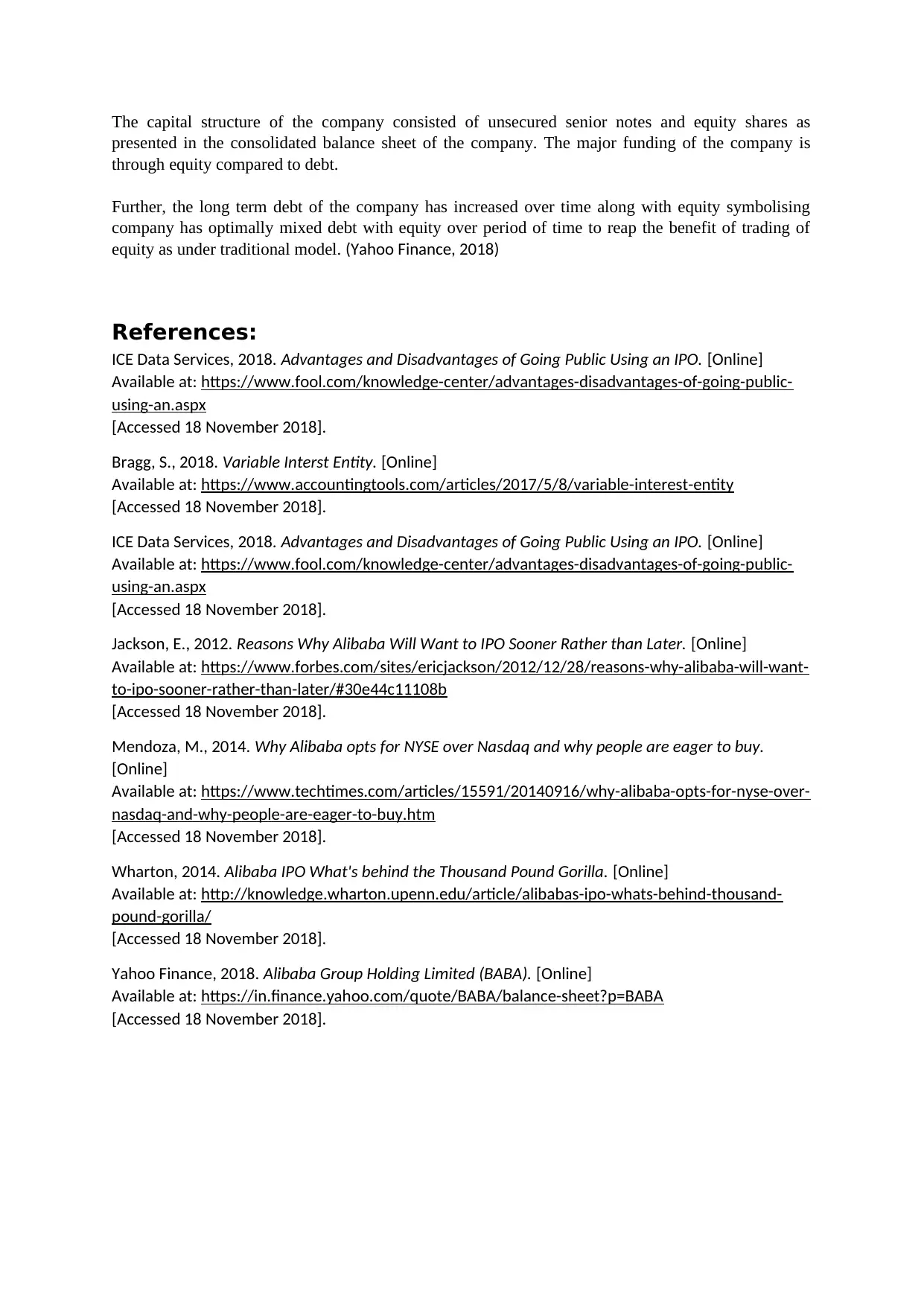
The capital structure of the company consisted of unsecured senior notes and equity shares as
presented in the consolidated balance sheet of the company. The major funding of the company is
through equity compared to debt.
Further, the long term debt of the company has increased over time along with equity symbolising
company has optimally mixed debt with equity over period of time to reap the benefit of trading of
equity as under traditional model. (Yahoo Finance, 2018)
References:
ICE Data Services, 2018. Advantages and Disadvantages of Going Public Using an IPO. [Online]
Available at: https://www.fool.com/knowledge-center/advantages-disadvantages-of-going-public-
using-an.aspx
[Accessed 18 November 2018].
Bragg, S., 2018. Variable Interst Entity. [Online]
Available at: https://www.accountingtools.com/articles/2017/5/8/variable-interest-entity
[Accessed 18 November 2018].
ICE Data Services, 2018. Advantages and Disadvantages of Going Public Using an IPO. [Online]
Available at: https://www.fool.com/knowledge-center/advantages-disadvantages-of-going-public-
using-an.aspx
[Accessed 18 November 2018].
Jackson, E., 2012. Reasons Why Alibaba Will Want to IPO Sooner Rather than Later. [Online]
Available at: https://www.forbes.com/sites/ericjackson/2012/12/28/reasons-why-alibaba-will-want-
to-ipo-sooner-rather-than-later/#30e44c11108b
[Accessed 18 November 2018].
Mendoza, M., 2014. Why Alibaba opts for NYSE over Nasdaq and why people are eager to buy.
[Online]
Available at: https://www.techtimes.com/articles/15591/20140916/why-alibaba-opts-for-nyse-over-
nasdaq-and-why-people-are-eager-to-buy.htm
[Accessed 18 November 2018].
Wharton, 2014. Alibaba IPO What's behind the Thousand Pound Gorilla. [Online]
Available at: http://knowledge.wharton.upenn.edu/article/alibabas-ipo-whats-behind-thousand-
pound-gorilla/
[Accessed 18 November 2018].
Yahoo Finance, 2018. Alibaba Group Holding Limited (BABA). [Online]
Available at: https://in.finance.yahoo.com/quote/BABA/balance-sheet?p=BABA
[Accessed 18 November 2018].
presented in the consolidated balance sheet of the company. The major funding of the company is
through equity compared to debt.
Further, the long term debt of the company has increased over time along with equity symbolising
company has optimally mixed debt with equity over period of time to reap the benefit of trading of
equity as under traditional model. (Yahoo Finance, 2018)
References:
ICE Data Services, 2018. Advantages and Disadvantages of Going Public Using an IPO. [Online]
Available at: https://www.fool.com/knowledge-center/advantages-disadvantages-of-going-public-
using-an.aspx
[Accessed 18 November 2018].
Bragg, S., 2018. Variable Interst Entity. [Online]
Available at: https://www.accountingtools.com/articles/2017/5/8/variable-interest-entity
[Accessed 18 November 2018].
ICE Data Services, 2018. Advantages and Disadvantages of Going Public Using an IPO. [Online]
Available at: https://www.fool.com/knowledge-center/advantages-disadvantages-of-going-public-
using-an.aspx
[Accessed 18 November 2018].
Jackson, E., 2012. Reasons Why Alibaba Will Want to IPO Sooner Rather than Later. [Online]
Available at: https://www.forbes.com/sites/ericjackson/2012/12/28/reasons-why-alibaba-will-want-
to-ipo-sooner-rather-than-later/#30e44c11108b
[Accessed 18 November 2018].
Mendoza, M., 2014. Why Alibaba opts for NYSE over Nasdaq and why people are eager to buy.
[Online]
Available at: https://www.techtimes.com/articles/15591/20140916/why-alibaba-opts-for-nyse-over-
nasdaq-and-why-people-are-eager-to-buy.htm
[Accessed 18 November 2018].
Wharton, 2014. Alibaba IPO What's behind the Thousand Pound Gorilla. [Online]
Available at: http://knowledge.wharton.upenn.edu/article/alibabas-ipo-whats-behind-thousand-
pound-gorilla/
[Accessed 18 November 2018].
Yahoo Finance, 2018. Alibaba Group Holding Limited (BABA). [Online]
Available at: https://in.finance.yahoo.com/quote/BABA/balance-sheet?p=BABA
[Accessed 18 November 2018].

⊘ This is a preview!⊘
Do you want full access?
Subscribe today to unlock all pages.

Trusted by 1+ million students worldwide
1 out of 6
Related Documents
Your All-in-One AI-Powered Toolkit for Academic Success.
+13062052269
info@desklib.com
Available 24*7 on WhatsApp / Email
![[object Object]](/_next/static/media/star-bottom.7253800d.svg)
Unlock your academic potential
Copyright © 2020–2026 A2Z Services. All Rights Reserved. Developed and managed by ZUCOL.





